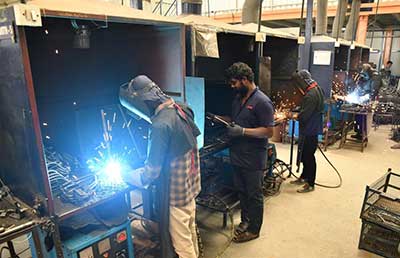Relevance: GS-3: Indian Economy, mobilization of resources, growth, development and employment.
Key Phrases: MSME, Integrated Rural Development Programme, Skilling and entrepreneurship, jugaad, entrepreneurial culture, SAMRIDH scheme, Start-up India Seed Fund, ASPIRE.
Why in News?
- The entrepreneurial culture is vital to give MSMEs and jobs a boost.
Context:
- The Integrated Rural Development Programme, which was initiated in the late 1970s and implemented across the country, was the most discussed enterprise development programme for those at the bottom of the pyramid. An asset was created by a bank loan and supported by a capital subsidy from the government.
- Programmes of this genre are being implemented by governments ever since. As a public policy, government intervention is appropriate as it must engage with the workforce since formal jobs in both public and private sectors are few. Such programmes could be more successful when our society celebrates entrepreneurs and inspires its citizens to consider choosing the path of entrepreneurship. Our aspiration of being on the world stage can become a reality only when entrepreneurship is cherished, valued and enterprises — small and big — power our economy.
How to bring Entrepreneurial Culture?
- Skilling and entrepreneurship development is the best option and micro industries could absorb the workforce from agriculture if strategised well. Here are a few ideas to imbue our society with an entrepreneurial culture.
- First, entrepreneurship is a mindset, and its orientation must begin in schools and colleges. Education typically is essentialism, whereas entrepreneurship is existentialism. Essay writing competitions on the subject every year across the country will create the necessary buzz. Calling for nominations in various categories and felicitating successful entrepreneurs can get our society thinking about entrepreneurship. High school students must be encouraged to test their business ideas.
- Second, India is a sub-continent and product requirements vary across regions. About 70 per cent of the products consumed in rural areas are produced locally. Characterising and improvising such products are necessary to instill the idea of excellence and remove the thought of jugaad. This transformation in local markets can propel exports to domestic and foreign markets. ‘One District One Product’ initiative is in this direction.
- Third, skilling must be contextualised to local needs, as opposed to general skilling like a BA or BSc course. Entrepreneurship must be institutionalised through NSDC like mechanisms.
- Fourth, boys and girls in rural schools know their ecosystem well and they should be taught elements of design and light engineering which can lead them to create enterprises. To illustrate, India’s is mainly small-holder agriculture, but we don’t have enough ergonomically designed tools and implements for the small farmer. ‘Atal Tinkering Labs’ can complement this idea.
- Fifth, the creation of the Ministry of Skill Development and Entrepreneurship in 2014, was a momentous decision. The ministry has gained considerable understanding of this area through several initiatives like skill gap assessment and skilling programmes. Our ITIs and tool rooms gave us valuable learnings on skilling. It’s time now to start ‘vocational schools’ as these can promote entrepreneurial culture. To get these started, banks and industry (through the CSR channel) can be invited to participate.
- Sixth, an enterprise requires a complete gamut of services — legal, finance, accounts, business-related manpower, machinery, etc. Making available these resources through a common pool will give a big boost to entrepreneurship.
Government initiative to boost Start-ups:
- SAMRIDH Scheme: Minister of Electronics Information and Technology (MeitY) launched the SAMRIDH scheme, which stands for Start-up Accelerators of MeitY for pRoduct Innovation, Development, and growth, on August 25, 2021, after a little over a week of his announcement that the government will support the start-ups in the initial stages. The SAMRIDH initiative is designed to provide funding support to start-ups along with helping them bring skill sets together which will help them grow successful.
- Start-up India Seed Fund: In January 2021, Prime Minister Narendra Modi announced the launch of the 'Start-up India Seed Fund' — worth INR 1,000 crores — to help start-ups and support ideas from aspiring entrepreneurs.
- Start-up India Initiative: The Prime Minister of India launched the Start-up India Initiative in the year 2016 . The idea is to increase wealth and employability by giving wings to entrepreneurial spirits. The government gives tax benefits to start-ups under this scheme and around 50,000 start-ups have been recognized via this scheme in a period of a little more than five years, in 2021.
- ASPIRE: The government has made continuous efforts to improve the social and economic aspects of life in rural areas of India and one of the most popular schemes that the Indian government has sanctioned in this regard is ASPIRE. A Scheme for Promotion of Innovation, Rural Industries and Entrepreneurship (ASPIRE) is a Government of India initiative and promoted by the Ministry of Micro, Small and Medium Enterprises (MSME)
Source: The Hindu BL
Mains Question:
Q. Identify the core problems related to Entrepreneurial Culture in India. Suggest measures to solve these problems. Comment.








